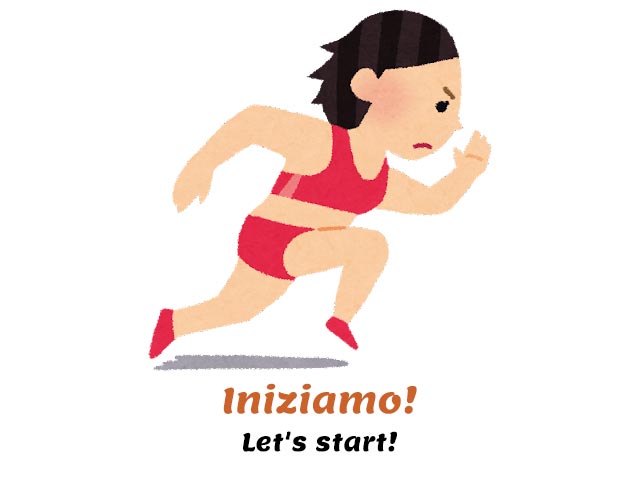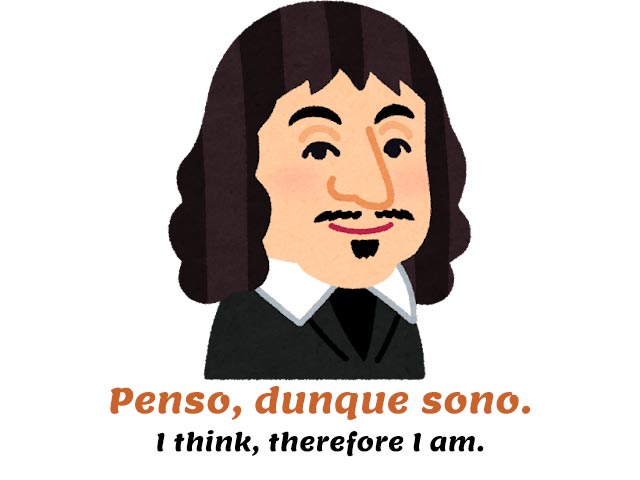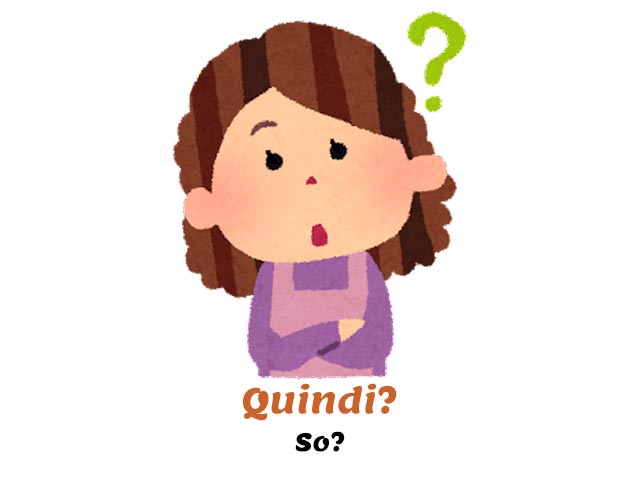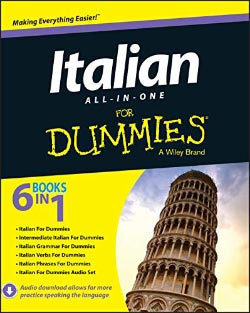How do you use the word quindi in Italian? What does it mean? How do you pronounce it
In this lesson, we will look at how to use this word with the help of many audio recordings and example sentences. Read on to learn everything you need to know!

Quindi in Italian
What is quindi?
Quindi is both an adverb and a conjunction.
As an adverb it means then, as in “he laughed, then he cried”. As a conjunction, it translates into English as “so” or “therefore” and is used to connect an effect to a cause. It’s a synonym for dunque.
Quindi
Then; so, therefore
Its pronunciation is close to koo-een-dee. If you have trouble pronouncing Italian sounds, check out the Italian pronunciation guide.
Now, let’s see some example sentences with quindi in Italian, before we take a look at how to use this word.
Title: Italian All-in-One For Dummies
Language: English / Italian
Publisher: For Dummies
Pages: 672
Learn to speak Italian like a native? Easy.
Italian All-in-One For Dummies appeals to those readers looking for a comprehensive, all-encompassing guide to mastering the Italian language. It contains content from all For Dummies Italian language instruction titles, including Italian For Dummies, Intermediate Italian For Dummies, Italian Verbs For Dummies, Italian Phrases For Dummies, Italian Grammar For Dummies, and Italian For Dummies Audio Set.
La donna provò un cappello dopo l’altro, quindi lasciò il negozio.
The woman tried on one hat after another, then left the hat shop.
Non posso permettermi di comprare una bicicletta nuova, quindi dovrò arrangiarmi con un vecchio modello.
I can’t afford to buy a new bicycle, so I’ll have to make do with an old model.
Bussò alla porta, quindi entrò.
He knocked on the door, then he came in.
Il cane mi ha mangiato il quaderno, quindi non ho fatto i compiti.
The dog ate my notebook, that’s why I didn’t do my homework.
Penso, dunque sono.
I think, therefore I am.

Now let’s see how to use quindi in Italian.
Use of quindi in Italian
Quindi can start a sentence, end a sentence, or be used to introduce a subordinate clause. In the second and third cases, it is always preceded by a virgola, a comma.
When it starts a sentence, it is used to introduce an assumption or a conclusion to someone else’s statement.
Quindi non hai passato l’esame?
So you didn’t pass the exam?
It’s used at the end of a statement to finish a thought that you’re saying out loud.
Non hai passato l’esame, quindi… Avresti potuto studiare di più.
You didn’t pass the exam, then. You could have studied more.
If it starts a subordinate clause, remember to put a comma before it.
Non ho studiato, quindi non ho passato l’esame.
I didn’t study, so I didn’t pass the exam.
As a question, quindi is used to ask someone to continue talking.
Quindi?
So?

However, there’s a very popular expression in Italian that goes e quindi?, which translates into English as “and so?”. People use it when they want someone to get to the point and are getting a little impatient.
E quindi?
And so?
And that’s the end of our lesson on how to use quindi in Italian!
What next?
Now that you’ve seen how to use quindi in Italian, you might want to keep learning Italian online with these free Italian resources:
❤️ If you liked this lesson on how to use quindi in Italian, consider sharing it with your social media friends who are also studying Italian.




